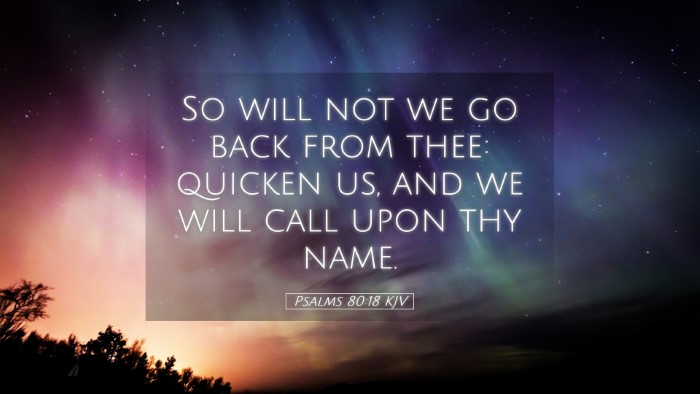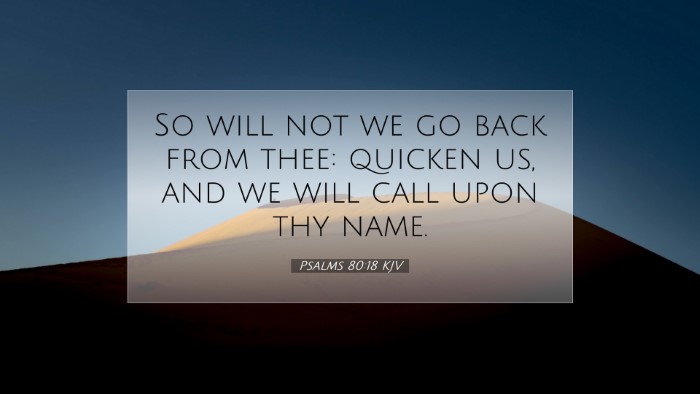Commentary on Psalms 80:18
Verse Text: "So will not we go back from thee: quicken us, and we will call upon thy name."
General Overview
Psalms 80 is a communal lament that expresses the deep sorrow of Israel during a time of suffering and national crisis. The psalmist appeals to God for restoration and intervention, and verse 18 encapsulates a commitment to faithfulness and earnestness in prayer. The plea for revival and recommitment to God hints at Israel's struggle to remain steadfast in the face of adversity.
Insights from Commentaries
Matthew Henry’s Commentary
Matthew Henry emphasizes the importance of the psalmist's declaration. He notes that this verse is a response to the realization of spiritual decline and a sincere longing for divine restoration. Henry points out that to "not go back" signifies a determination to remain steadfast in faith and reliance on God. He interprets the plea for being "quickened" as a request for spiritual revival and strength, underscoring that only by God’s power can they regain their vitality.
Henry also highlights the assurance that follows the commitment: "we will call upon thy name." This reflects a covenantal relationship where Israel acknowledges God as their sole source of help. The acknowledgment of their need for God’s intervention is significant, as it places the responsibility on God while expressing the necessary response of the people.
Albert Barnes’ Notes on the Bible
Albert Barnes provides a theological reflection on the implications of the verse. He observes that the repetition of "we will not go back" serves as a vow of fidelity amidst prevalent temptation to revert to past sins and struggles. Barnes asserts that this declaration implies a recognition of the dire need for God’s mercy and the transformative power that God holds.
Barnes notes that the word "quicken" carries the meaning of being made alive, both physically and spiritually. He explains that this revival is essential for the Israelites who have experienced desolation. They are not only pleading for physical restoration but spiritual rejuvenation as well. The act of calling upon God’s name is presented as the proper response when one is in a position of need, highlighting the intimate relationship between humanity and the Divine.
Adam Clarke’s Commentary
Adam Clarke emphasizes the context of Psalms 80 as a prayer of the Israelites seeking "safety and restoration." Clarke suggests that the phrase "will not we go back from thee" signifies a deliberate choice to maintain faith despite challenges. He draws attention to the resolve expressed in the verse, illustrating a conscious decision to not forsake their relationship with God.
In his analysis, Clarke interprets "quicken us" as not just an appeal for revival but an urgent longing for spiritual awakening. He points out that without divine assistance, the nation cannot sustain its identity or purpose. Clarke elaborates on the association of calling upon God's name with the act of prayer and dependence, which becomes a testament of their faith and reliance upon God's faithfulness.
Theological Implications
- Commitment to God: The declaration signifies a profound commitment to not turn away from God, suggesting a resolve amidst trials.
- Need for Divine Intervention: The plea for being quickened emphasizes the necessity for God's grace to invigorate the spirit and renew strength.
- Community and Covenant: The corporate nature of the psalm reflects the communal aspect of faith, drawing attention to the collective responsibilities of God's people.
- Prayer as Response: The emphasis on calling upon God's name stresses the importance of prayer in the life of believers, particularly in times of distress.
Conclusion
Psalms 80:18 serves as a rich source of theological reflection on faithfulness, revival, and prayer. The insights from public domain commentaries reflect a deep understanding of the human condition, particularly the challenges believers face in maintaining their relationship with God. As pastors, students, theologians, and Bible scholars engage with this verse, it invites them to consider the broader themes of commitment, community, and reliance on divine intervention in both personal and communal aspects of faith.


